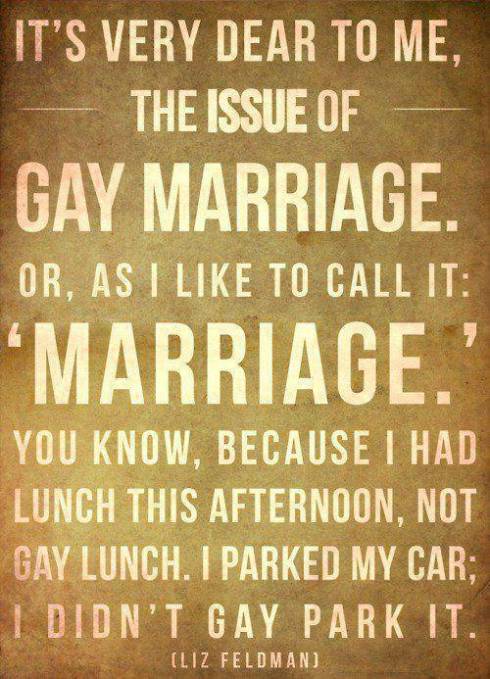Recently, I’ve had a number of friends who have shown genuine surprise when they hear that gay people cannot get married in Ohio yet. So, in order to better educate those who ask and to get a better understanding myself, this is a run-down of some of the laws for and against LGBTQ people in the US.
1. There are 17 states–plus D.C.) that allow same-sex marriage. These are Washington, California, Hawaii, New Mexico, Minnesota, Iowa, Illinois, New York, Massachusetts, Rhode Island, Maine, Connecticut, New Jersey, Delaware, New Hampshire, Maryland and Vermont.
2. Two states, Nevada and Colorado, allow full civil unions and domestic partnerships.
3. Oregon both allows full civil unions and domestic partnerships and recognizes out-of-state marriages.
4. Wisconsin recognizes partial relationship status, which gives same-sex couples some of the same rights as heterosexual couples.
Now, recently there’s been this big drive of federal judges ruling that bans against same-sex marriage are unconstitutional; in fact, this happened in Kentucky just over a week ago. It happened in Utah in December, as well, but then the same-sex marriage ban ban was banned…which got awkward fast.
Ohio, not surprisingly, doesn’t make it into any of these categories. Ohio does not allow same-sex marriage, does not recognize marriages or partnerships from other states, and has no other type of legal recognition for same-sex relationships. This means that a couple who has been together for their entire adult lives are still granted 0 rights as a couple. While a few years ago, Obama ruled that hospitals cannot limit gay couples’ visitation rights, there are no legal rights recognizing the other partner if there is a death. “If a couple is not married and one partner dies, the other partner is not entitled to bereavement leave from work, to file wrongful death claims, to draw the Social Security of the deceased partner, or to automatically inherit a shared home, assets, or personal items in the absence of a will” (freedomtomarry.org).
“Surely not being legally recognized in a relationship isn’t the most horrible thing that could happen! It’s not like there are other rights being denied LGBT people.” Ah, but is it the only thing? Let’s take a look.
State law mandates that employees of the state and local governments be protected on the bases of both sexual orientation and gender identity/expression–YAY. State law does NOT protect employees in the private sector from either of these things. What does this mean? If I work for a private company and they somehow discover that I am gay, I could be fired without any other cause needed. Essentially, an employer could fire me because they are homophobic and the homophobia would be protected under the law.
But that’s not too bad, right? Just stay in the closet at work; after all, straight people aren’t always announcing that they’re straight! One day I will probably tell you the story of when my best friend forced me to come out at work, but that’s not today. I’m just bringing it up to say sometimes things happen and employers find out.
“So you can’t get married and you might get fired; that still doesn’t sound too bad!” Alright, let’s keep looking.
We can’t adopt! Unless we have really, really good lawyers. I have to stop here a minute, as adoption runs in my family’s blood. I think of the thousands of really crummy parents out there whose parental rights are (or need to be)–for the good of the children–stripped from them. Then I think of all of the children who are stuck in the foster system just waiting for someone capable of loving them and caring for them, many until they age out. I could adopt without my partner being legally named as the other parent, but if something happened to me (say, for instance, death), the state could very easily take away OUR child just because they would not view my partner as the child’s legal parent. That’s stupid, guys.
Finally, there’s the issue of bullying. Did you know that bullying is outlawed in the state? Bullying in public schools and online is prohibited. Do you know what isn’t? Issues of bullying specifically surrounding sexual orientation or gender identity. Do you know where the state doesn’t prohibit bullying? Private schools and religious schools. There are new bullying cases coming to light all the time, children who don’t feel safe going to school (private or public) because they hate being called names, being pushed around, being beaten up. Some decide that they would rather die than face their peers. That should never have to go through a child’s head; it should never happen. And it is all the time.
If we tell children who either identify as LGBTQ that they are not worth protecting, and that they are deserving of the words and actions against them, they will grow up believing that to be true. And just as sad are their peers, who will see that LGBTQ are supposed to be treated differently, poorly, and will grow up continuing to treat them that way. They will vote against them. They will teach their children to hate them.
